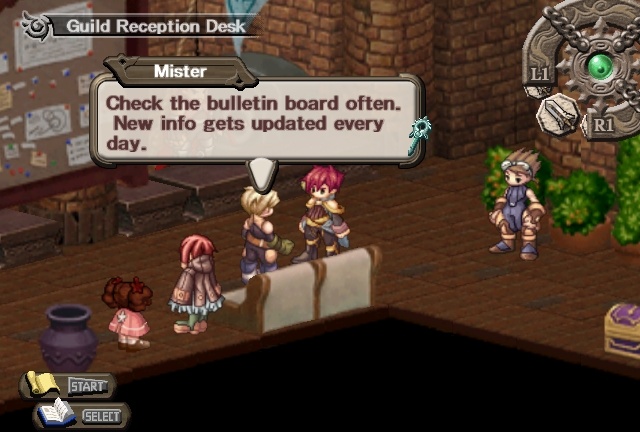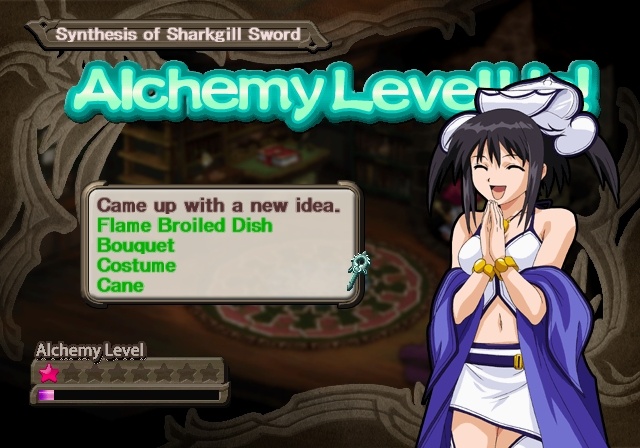The previous Atelier Iris games hark back to role-playing games of old and succeeded largely on their good-natured sweetness. Grand Phantasm certainly maintains much of the cute appeal but suffers from tedious quest design and a dud of a narrative. It doesn't feel like an old-fashioned RPG; it just feels old. The result is an inoffensive and forgettable adventure with a lot of character but little substance.

In this installment, young Edge and his alchemist friend Iris are on the search for gems that will piece together a book that grants the owner any wish. They are also members of the Raiders guild, which doles out quests to mercenaries looking for a buck or two. In the course of the gem search, Edge and Iris happen upon fairylike creatures called manas, which gradually help unlock the mystery of the gems, as well as bestow more abilities on the party as the game progresses. The stakes aren't particularly high, and though the story develops some intrigue as it unfolds, it never feels close to epic. Considering how much time it takes to get to anything interesting, late-game developments are a letdown.
Where Grand Phantasm succeeds is in its characters. Edge isn't a particularly noteworthy hero, but that's OK because Iris has enough personality for the both of them. While the actress that voices her isn't great, she approaches her lines with the same kind of silly charisma that permeates most of the dialogue. Once your party gains a third member, the easygoing banter gets even nuttier. You'll meet a grouchy guilder, a sweet ghost, and a love-smitten researcher, amongst many others, who are all kooky in their own ways. Spoken dialogue is accompanied by colorful character portraits that often look even more hysterical than the lines that accompany them, so everything has an over-the-top appeal. It's too bad that all the fun is limited to the side quests, while the main story fizzles long before you begin to care.
Actually, that's all the fun there is to the side missions. The basic quest design has you heading to the guild and grabbing random fetch quests that you must complete to level your party, as well as to gain levels within the guild. The story continues once you've reached the appropriate guild rank, but in the meanwhile, you're stuck with such random tasks as angling for blowfish or killing any number of monsters. So you get a quest from the bulletin board, head to the appropriate area, complete the quest, and return for the reward. Side quests may be a standard RPG convention, but here, they are all disconnected and generally don't relate to the story arch.
The dungeons and forests you explore are called alterworlds, which is where one of Atelier Iris 3's more interesting conventions comes into play. When you enter an alterworld, a countdown timer limits how long you can spend there before you're automatically whisked back to town. On the one hand, the system works well. Each alterworld visit comes with a sense of urgency because you have only so long to find your item or fight the right monster before you're kicked out. That kind of immediacy is uncommon in most RPGs and is one of the game's bright spots. On the other hand, it also inhibits exploration and general meandering, which makes a game with such a splintered quest design feel even more fractured.
The active time system of Atelier Iris 2 has been replaced in Grand Phantasm with a basic turn-based affair ripped from the standard book of Japanese RPGs. Each character gets a standard attack, as well as a set of more powerful skills that draw from a skill gauge that gradually fills as you battle. You also have a burst meter that fills during combat. Once it's full, you enter burst mode for a short period, and your attacks dole out a great deal more damage. It's nothing terribly special, nor is it ever very difficult. Even the boss battles don't offer much challenge, so it's just a matter of taking the time to get through them. Thankfully, you won't need to worry about random encounters because monsters are represented by moving blobs and can be avoided when necessary.
Because Iris is an alchemist, you can also synthesize a bunch of different items using elements you encounter in your travels or loot from monsters. You make all sorts of stuff, from weapons and armor to steak and statues. You'll need to create some products to turn in for quests, though you'll end up using most of the stuff yourself. In fact, you may never need to visit a vendor because you can just head to the bubbling cauldron in your workshop and whip up what you need on your own. It's also the source of much in-game merriment because Iris will wax humorously over items in the environment that inspire her to make something new; for which she will get a semi-rude reply from ever-pessimistic Edge.

There is nothing modern about the production values in Atelier Iris 3. Like its predecessors, Grand Phantasm uses 2D sprites that move about hand-drawn environments. The graphics are functional and colorful, but terribly dated by today's standards. Most of the environments are fairly bland, though there are a couple of stunning artistic set pieces, such as the entrance to the imposing Castle Grimoire. Your adventures are accompanied by a cute but annoying soundtrack that gets old after the first couple of hours, while the voice acting ranges from second-grade-class-play quality to community-college-drama-course quality.
If you liked the previous Atelier Iris games, you'll probably like Grand Phantasm as well. It's got a few things going for it: silly dialogue, likeable characters, and a fun little alchemy system. It's good that it doesn't take itself too seriously. But without an epic story, involving quests, or any twists on the same-old turn-based battles, it just feels hollow. Amusing? Yes. Remarkable? No.